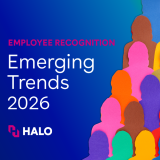Summary
When done well, rewards and recognition programs build trust and positivity among employees, inspiring them to do great work that improves your bottom line.
When done well, rewards and recognition programs build trust and positivity among employees, inspiring them to do great work that improves your bottom line. Research and experience tell us that companies fielding best-practice recognition programs will, in general, be more successful in the areas of turnover, productivity, and profits.
But since so many other factors can influence turnover, productivity, and profits, it can be difficult to pinpoint the actual effect recognition is having. This is where organic feedback, that is, feedback that can’t be organized in a spreadsheet, plays an important role.
The most telling effects of recognition should be on your culture. Good work doesn’t come from nowhere – only when teams are energized and engaged in a culture do they start putting more effort into supporting that culture. The daily work environment you create is your culture.
Culture change is an important result that cannot be measured with numbers. It’s something that develops organically. It is possible to take its temperature however, with the help of a feedback mechanism for organic results.
Good news is, this is not complicated in the least. Simply ask your frontline managers some thoughtful questions on a regular basis:
- In three words, how would you describe the daily “vibe” of the workplace?
- Do employees look/sound/feel happy to be there?
- Do employees show genuine fun/calm/diligence while working?
Simple questions like these can open up lots of doors into conversations about how you can jazz the work environment up to be more in-tune with what is needed to work better. Your frontline managers, who interact with employees on a daily basis, are best-equipped to deliver these culture reports.
Asking the same few questions on a monthly basis and paying close mind to how your culture adapts, grows, or remains stagnant can help clarify what is working well in certain areas can help you balance recognition efforts in others.
Managers are in many ways the biggest influencers on employee engagement. Taking the time to consult with them on recognition efforts and developing a method for reporting on organic change is a sure way to always be ahead of your employees’ expectations.













